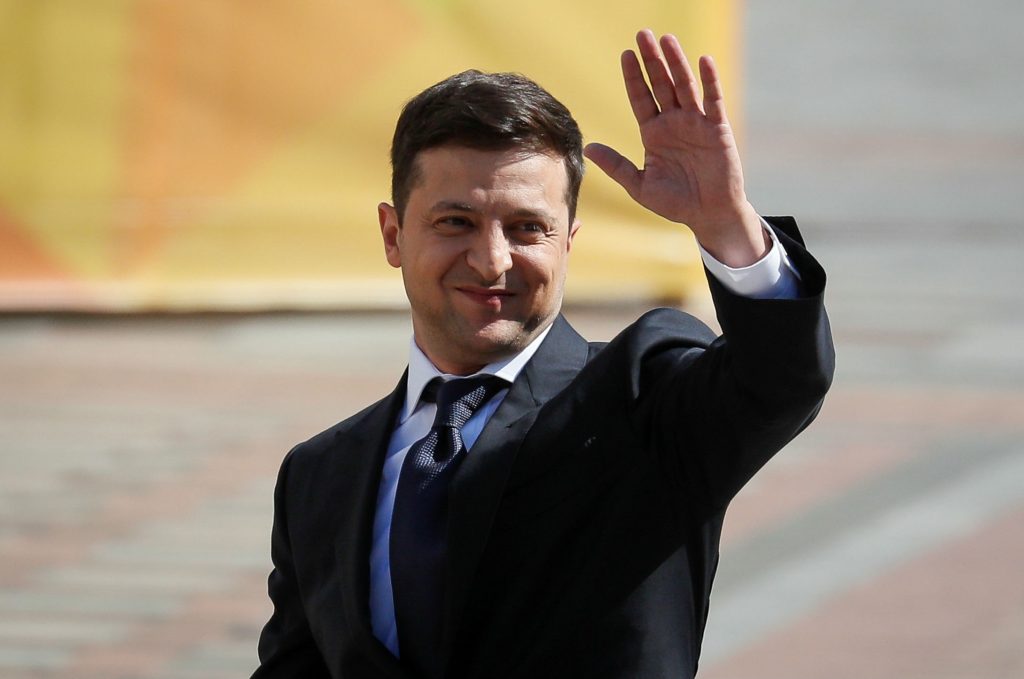Wasting little time after winning Ukraine’s April 21 presidential election in a landslide, the country’s new president, Volodymyr Zelenskiy, vowed in his inauguration speech on Monday to dissolve the parliament and hold early elections. After winning 73 percent of the vote in the second round, Zelenskiy may be hoping to ride the political wave, and early polls show his party in the lead, with 26 percent support.
Originally scheduled for October 27, elections for the parliament, or Rada, will now be as early as July 21, if Zelenskiy has his way. The new president also indicated a desire for a wholesale change in government appointees, and a number of officials, including the prime minister, Volodymyr Groisman, have announced their resignations. A new day may be dawning in Ukraine.
A political neophyte who has only played president on television, Zelenskiy faces significant challenges in rooting out corruption, boosting the economy, and staving off Russian aggression as well as a rising pro-Russian opposition bloc in the Rada. These issues were the main focus of his speech on Monday.
“Our first task is a ceasefire in the Donbas,” he declared to large applause. “We didn’t start this war but it is up to us to end it.”
Zelenskiy campaigned on a pro-Euro-Atlantic platform, supporting Ukraine’s deeper integration into NATO and the European Union, and pledged to pursue those who have been stealing from the public trough, an issue that appealed to many Ukrainians. Much of his support, in fact, reflected a strong anti-establishment sentiment, and his call in his inaugural speech to strip parliamentary immunity is sure to play well.
Zelesnkiy’s appointments to key positions such as minister of foreign affairs, minister of defense, and prosecutor general will provide an early indication of his agenda. His choice for chief-of-staff has raised early concerns because of his ties to controversial oligarch Ihor Kolomoiskiy.
The international community should not sit back and wait; it must proactively embrace Zelenskiy and his new team and provide support to help Ukraine defend itself against further Russian encroachment, boost the economy, and address the cancer of corruption.
Zelenskiy is Ukraine’s sixth president since the country regained its independence with the break-up of the USSR. Russia, where President Vladimir Putin has been in power for 19 years including a four-year stint as prime minister where he continued to call all the shots, and Belarus, where President Alexander Lukashenka has been in power since 1994, have had four presidents combined in the same period.
Two days before the second round of voting, Poroshenko participated in a raucous debate. He graciously conceded defeat minutes after the polls closed. It is hard to envision either Putin or Lukashenka doing those things, given that “elections” in Russia and Belarus are decided well before voters cast their ballots and the incumbents are assured victory and don’t even bother with debates. The notion that a true outsider could pull off an election victory, as happened in Ukraine, is unthinkable in either Russia or Belarus.
Votes for Zelenskiy came from across the country, undercutting a Kremlin talking point that Ukraine is a deeply divided state. That Zelenskiy is Jewish—and that Ukrainians didn’t care about that when casting their votes—undermined another Russian propaganda meme that Ukraine is run by fascists and neo-Nazis.
None of this has been easy. After all, for more than five years, Ukraine has been at war with Russia because of Putin’s desire to prevent Ukraine from becoming a successful, democratic, prosperous alternative model to the corrupt, authoritarian system Putin has overseen in Russia. Putin’s occupation of parts of Ukrainian territory, including Crimea and parts of the Donbas region, meant that some 16 percent of Ukraine’s electorate was disenfranchised, blocked from participating in the election.
A report released last week, the joint effort of the Atlantic Council, the Viktor Pinchuk Foundation, and the Transatlantic Commission on Election Integrity, described a serious Kremlin disinformation campaign designed to discredit the very notion that Ukraine was able to conduct a free and fair election. And while Ukraine did not endure a massive cyber-attack during this year’s election as it did in the 2014 presidential race, that was due in part to Ukrainian authorities’ greater vigilance toward Russian hacking and interference.
Ukraine’s political leaders and civil society, however, cannot become complacent. One can be certain that the Kremlin will seek to interfere in the upcoming Rada election.
Success in Ukraine—meaning a democratic, prosperous country with a Euro-Atlantic orientation—is in Ukrainians’ interest but also in the interests of the rest of Europe and of the United States and Canada. Ukraine is a key piece to realizing the vision of a Europe whole, free, and at peace. Eventually, one day, success in Ukraine will redound to the benefit of Russia and Belarus, too.
David J. Kramer is senior fellow of the Vaclav Havel Program on Human Rights and Diplomacy at Florida International University’s Steven J. Green School of International & Public Affairs and a former Assistant Secretary of State for Democracy, Human Rights and Labor; John E. Herbst is director of the Eurasia Center at the Atlantic Council and a former US Ambassador to Ukraine.
Image: Ukraine's President-elect Volodymyr Zelenskiy waves as he walks to take the oath of office ahead of his inauguration ceremony in the parliament hall, in Kyiv, Ukraine May 20, 2019. REUTERS/Gleb Garanich
